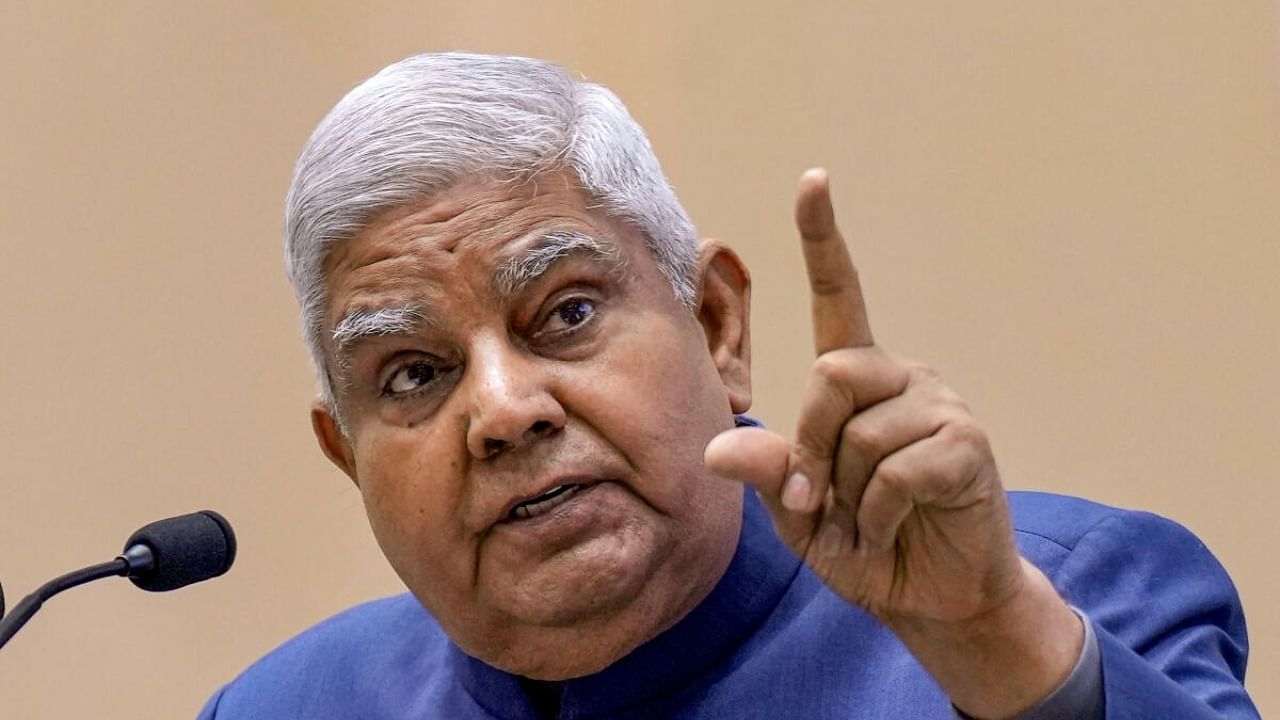
Rajya Sabha Chairman Jagdeep Dhankar may be in danger of slowly turning his office into that of the Praetorian Guard for the regime.
In early March, he had railed against Congress leader Rahul Gandhi for a speech he had made in London claiming that what Gandhi said was "thoughtless, unfair denigration of our well-nurtured democratic values". He had called upon the “intelligentsia, media and youth" to "rise to the occasion, expose" and "neutralise" those who "run down" India’s "democratic values". He had been criticised at that time for not maintaining his high constitutional office at an arm’s length from the executive, and advised by the Congress not to be “a cheerleader” of the government.
Dhankar, however, insists on listening to his own drummer. Now, he is taking on another Opposition MP for being critical of one of the twin-pillars of the Narendra Modi regime, Union Home Minister Amit Shah. This time around, he is examining whether CPI(M) MP John Brittas had indeed been “seditious” in his criticism of Shah, prompting an uproar from Opposition MPs wondering the basis of his action. The irrepressible Trinamool Congress MP Mahua Moitra even wondered in a tweet: “Err… the Upper House is the RS, NOT the RSS. Someone please tell the powers that be.”
Also Read: Outrageous bid to curb free speech
The summoning of Brittas by the Chairman of the Rajya Sabha for an article he wrote in The Indian Express is an example of ‘authority creep’. Neither Dhankar nor the Rajya Sabha Secretariat seem to have applied their mind before sending a notice seeking an explanation from Brittas about his article criticising Shah’s election rhetoric in Karnataka, targeting Kerala.
In his article, Brittas took exception to Shah claiming at an election rally in Karnataka that only the Bharatiya Janata Party (BJP) could keep Karnataka safe, unlike Kerala next door, and wrote that ‘This is not the first time that he has made such innuendos against a state whose people have steadfastly rejected his majoritarian politics. Nor is he the only senior leader from the BJP to trash the most literate state in this country.’
Dhankar’s action against Brittas is egregious on several counts. The Rajya Sabha Secretariat and the Chairman acted on a petition by a BJP office bearer — P Sudheer, general secretary of the party’s Kerala unit. Sudheer is a member of the ordinary public. The petition should have been sent to the government through the Ministry of Parliamentary Affairs, unless it involved breach of privilege of a Rajya Sabha MP or the House.
Dhankar’s action also comes against the background of the government being put on the backfoot after the Supreme Court began hearing on a clutch of petitions arguing that the sedition law under Article 124A of the Indian Penal Code was unconstitutional. Sedition law, the petitions suggested, was being used under the current regime for suppressing free speech and dissent and a number of individuals, including journalists, students, protestors, and activists, had been charged with sedition.
The government has sought postponement of the hearing till after the Monsoon Session of Parliament in August because it was apparently in “advanced stages of consultation” to re-examine the sedition law. Meanwhile, the Supreme Court has instructed the Centre and the States not to file any new FIRs citing sedition and to put on hold all investigations, trials, and other actions under the sedition law. To then summon an MP for allegedly ‘seditious’ comments against this backdrop not only shows lack of sensitivity, but also utter disregard for the apex court.
The Rajya Sabha’s Rules of Procedure define privilege, quoting Erskine May’s Parliamentary Practice: ‘Parliamentary privilege is the sum of certain rights enjoyed by each House collectively... and by members of each House individually, without which they could not discharge their functions, and which exceed those possessed by other bodies or individuals. Some privileges rest solely on the law and custom of Parliament, while others have been defined by statute. … Fundamentally, however, it is only as a means to the effective discharge of the collective functions of the House that the individual privileges are enjoyed by members. When any of these rights and immunities is disregarded or attacked, the offence is called a breach of privilege and is punishable under the law of Parliament.’
The Rajya Sabha’s Rules of Procedure also state, ‘It is a breach of privilege and contempt of the House, to make speeches or to print or publish any libels reflecting on the character or proceedings of the House or its committees or on any member of the House for or relating to his character or conduct as a Member of Parliament.’
Did Brittas impede the functioning of Shah in Parliament? His views were neither libellous nor against the dignity or authority of the home minister. Brittas did not disclose anything that was in the domain of the Rajya Sabha, e.g., premature publication of confidential proceedings of a parliamentary committee. Nor did he publish anything about the proceedings of the House or its committees with mala fide intent or by distorting them.
Most importantly, all this would matter if the authority of Dhankar extended to the Lok Sabha as Shah is a member of the lower house from Gandhinagar in Gujarat. Shah’s privileges will be protected by the Speaker of the Lok Sabha, if needed, and not by Dhankar or the Rajya Sabha Secretariat. They have no authority to protect Shah’s privileges as an MP.
Under what legal or legislative authority then did Dhankar summon Brittas? Chairman Dhankar is clearly overstepping and stretching his authority. He should, therefore, be prepared to face public criticism for what can only be seen as yet another attempt at silencing those who differ with the executive.
(Bharat Bhushan is a Delhi-based senior journalist)
(Disclaimer: The views expressed above are the author's own. They do not necessarily reflect the views of DH)